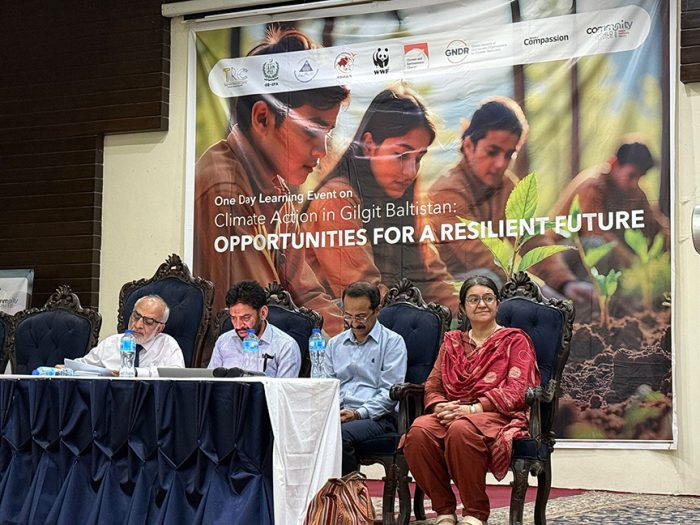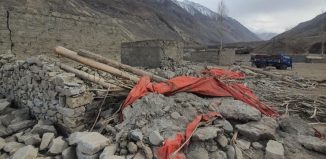CWSA hosts Climate Change Learning Event at Karakoram International University
On July 3, 2025, Community World Service Asia (CWSA) organised a transformative Climate Change Learning Event titled ‘Climate Action in Gilgit Baltistan: Opportunities for a Resilient Future’ at Karakoram International University (KIU) in Gilgit, bringing together climate change experts, local stakeholders, and students to address the pressing challenges of climate change in Gilgit-Baltistan. The event, attended by a diverse audience, emphasised the urgent need for education, community-led solutions, and collaborative action to build resilience in one of the world’s most climate-vulnerable regions.
Dr. Sajjad Ali, Associate Professor and Director of Academics at KIU, delivered the welcome address, urging young students to act. “It is a form of disrespect against nature to not take action towards climate change efforts,” he stated, highlighting Pakistan’s vulnerability as one of the top 10 countries affected by climate change. He noted a critical barrier, “We are among the lowest to benefit from climate change funds due to a lack of education, awareness, and advocacy.” Dr. Ali proposed investing in youth education as a key solution to this global crisis.
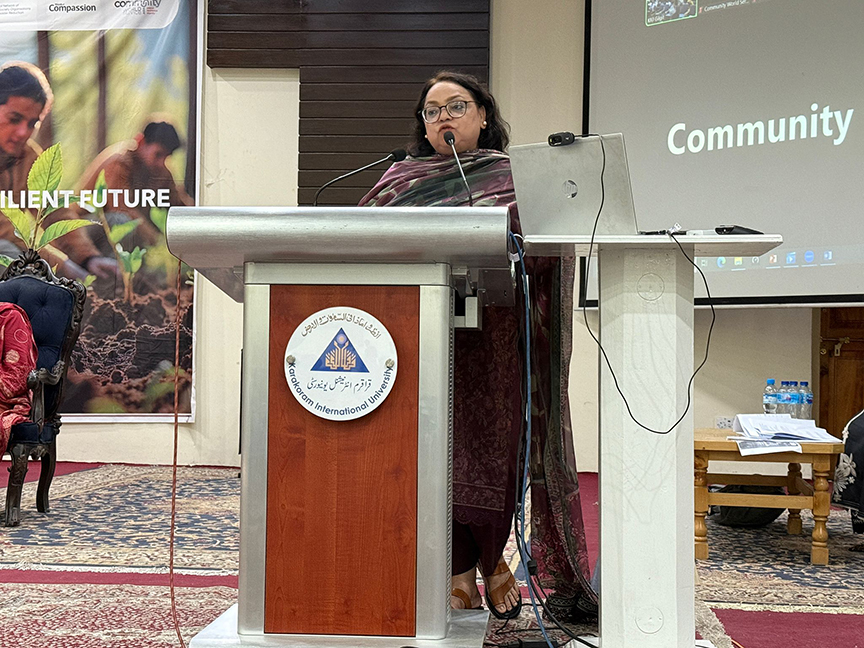
Takashi Komino of the Asian Disaster Response and Reduction Network (ADRRN) emphasised the prevalence of floods and storms as the most frequent disasters in Asia. He advocated for community-led strategies, stating, “We need to turn technical science into people’s science, reaching communities in ways they understand.” Despite a brief internet disruption, his message resonated, underscoring the importance of accessible, community-driven approaches.
Khadim Hussain, Director of the Environmental Protection Agency, highlighted the value of youth and indigenous knowledge. “We have faced numerous challenges, but we are still surviving. Together, we can take collective action,” he said, advocating for natural resource-based solutions and increased awareness efforts by NGOs.
Nishanie Jayamaha, a climate expert, stressed the need for community-aligned strategies. “We must constantly evaluate if our strategies are helping and working with communities. Misaligned approaches can cause harm,” she cautioned, urging organisations to prioritise community needs to avoid unintended consequences.
Dr Iftikhar Ali, Senator at KIU emphasised on active participation and contribution of local governments, he shared that “Local governments play a vital role in building climate-resilient and sustainable communities by implementing green policies, promoting renewable energy, and ensuring infrastructure can withstand climate impacts”.
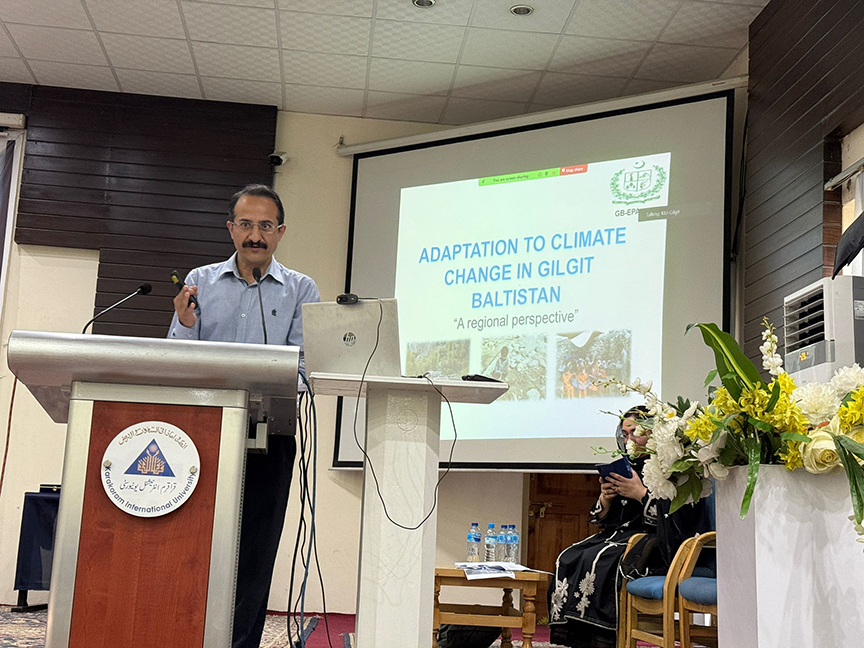
Dr. Farasat Ali of World Wildlife Fund Pakistan shared alarming data, noting that climate change costs Pakistan $30 billion annually. He highlighted the risks posed by 33 of the 3,044 glacial lakes in northern Pakistan, classified as hazardous zones for extreme flooding, threatening lives and economic stability. “Increased water temperatures will also affect freshwater sources, impacting fishing and farming,” he added, emphasising the widespread impact across urban and rural communities.
Tabinda Jabeen from the Teacher Resource Center underscored the role of education in preparing Pakistan’s youth for a climate-challenged future. “Children and youth are our future. We must share knowledge and collaborate to equip them for the world we are leaving behind,” she said.
A KIU student studying climate change offered a compelling perspective, suggesting, “We should use local languages instead of English to educate communities and incorporate indigenous knowledge into community-based adaptation efforts for greater success.”
Dr. Shaukat Ali of KIU delivered a powerful closing statement: “Climate change is no longer a distant threat. It is here, and it is very real.”
The event culminated in a significant milestone, the signing of a Memorandum of Understanding (MoU) between CWSA, and the Vice Chancellor of KIU, on behalf of the Gilgit-Baltistan government. This MoU formalises a commitment to collaborate on climate change education and resilience-building initiatives, marking a promising step for CWSA and the communities of northern Pakistan facing escalating climate challenges.
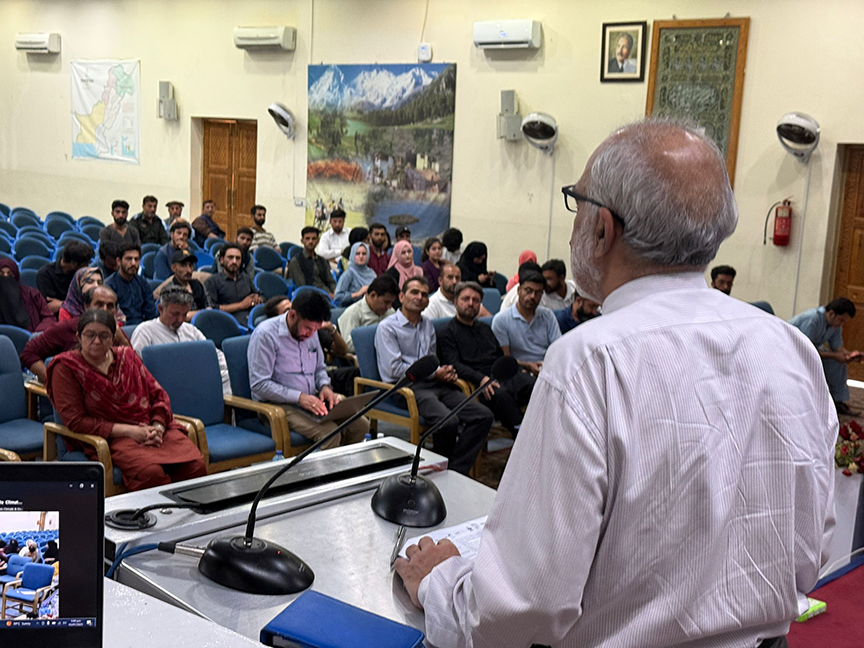
This event, supported by partnerships with KIU and other stakeholders, reflects CWSA’s dedication to fostering dialogue, raising awareness, and driving collective action to address climate change in Gilgit-Baltistan. By empowering youth, integrating indigenous knowledge, and strengthening local collaborations, CWSA continues to pave the way for a more resilient and sustainable future.





